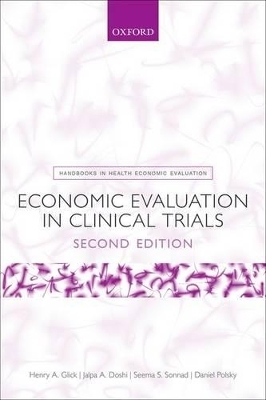
Economic Evaluation in Clinical Trials
Oxford University Press (Verlag)
978-0-19-968502-8 (ISBN)
It is becoming increasingly important to examine the relationship between the outcomes of a clinical trial and the costs of the medical therapy under study. The results of such analysis can affect reimbursement decisions for new medical technologies, drugs, devices or diagnostics. It can aid companies seeking to make claims about the cost-effectiveness of their product, as well as allowing early consideration of the economic value of therapies which may be important to improving initial adoption decisions. It is also vital for addressing the requirements of regulatory bodies.
Economic Evaluation in Clinical Trials provides practical advice on how to conduct cost-effectiveness analyses in controlled trials of medical therapies. This new edition has been extensively rewritten and revised; topics discussed range from design issues such as the types of services that should be measured and price weights, to assessment of quality-adjusted life years. Illustrative materials, case histories and worked examples are included to encourage the reader to apply the methods discussed. These exercises are supported with datasets, programmes and solutions made available online.
Henry A. Glick, Ph.D., received an M.A. and Ph.D. in Public Policy Analysis from the University of Pennsylvania. He has more than 25 years of experience conducting economic assessments of medical therapies. He specializes in economic evaluations conducted as part of clinical trials. Henry served on the Randomized Clinical Trial-Cost Effectiveness Analysis (RCT-CEA) Task Force and the Task Force on Good Research Practices on Transferability of Economic Data in Health Technology Assessment, both chartered by the International Society of Pharmaceutical Outcomes Research (ISPOR) to develop guidance documents related to these issues. Daniel Polsky, Ph.D., has been on the faculty at the University of Pennsylvania since 1996. He is the Executive Director of the Leonard Davis Institute of Health Economics, Professor of Medicine in the Perelman School of Medicine and the Robert D. Eilers Professor of Health Care Management in the Wharton School. He currently serves on the Congressional Budget Office's Panel of Health Advisers and he was the Senior Economist on health issues at the President's Council of Economic Advisers in 2007-08. His research areas include access to health care, workforce, and economic evaluation of medical and behavioral health interventions. Seema Sonnad, Ph.D., is interested in how patients, physicians and health systems use (or fail to use) evidence when making decisions about new technology. She has been involved in collaborative work leading to over 130 published papers and after being Director of Outcomes Research in departments of surgery for over 10 years, is now Director of Health Services Research for the Value Institute at Christiana Care Health System. She continues to work collaboratively with physicians to understand how changing practice impacts care and how to incorporate best evidence into care decisions. Dr. Jalpa Doshi's research focuses on economic and outcomes assessments of medication use and adherence in vulnerable patient populations such as the elderly, disabled, and chronically ill using observational as well as randomized trial data. She is regularly invited to teach methodology courses and workshops on cost-effectiveness analyses in randomized trials and analytic techniques to examine health care cost data at scientific meetings. She has served on the International Society of Pharmaceutical Outcomes Research (ISPOR) Task Force Quality Improvement in Cost Effectiveness Research. She currently serves as co-editor of the Value in Health Journal.
1. Introduction to economic evaluations in clinical trials ; 2. Designing economic evaluations in clinical trials ; 3. Valuing medical service use ; 4. Assessing quality-adjusted life years ; 5. Analyzing cost ; 6. Analyzing censored cost ; 7. Comparing cost and effect: point estimates for cost-effectiveness ratios and net monetary benefit ; 8. Understanding sampling uncertainty: the concepts ; 9. Sampling uncertainty: calculation, sample size and power, and decision criteria ; 10. Transferability of the results from trials ; 11. Relevance of trial-based economic analyses
| Erscheint lt. Verlag | 16.10.2014 |
|---|---|
| Reihe/Serie | Handbooks in Health Economic Evaluation |
| Verlagsort | Oxford |
| Sprache | englisch |
| Maße | 156 x 233 mm |
| Gewicht | 400 g |
| Themenwelt | Studium ► Querschnittsbereiche ► Epidemiologie / Med. Biometrie |
| Studium ► Querschnittsbereiche ► Prävention / Gesundheitsförderung | |
| Wirtschaft ► Volkswirtschaftslehre | |
| ISBN-10 | 0-19-968502-9 / 0199685029 |
| ISBN-13 | 978-0-19-968502-8 / 9780199685028 |
| Zustand | Neuware |
| Haben Sie eine Frage zum Produkt? |
aus dem Bereich


